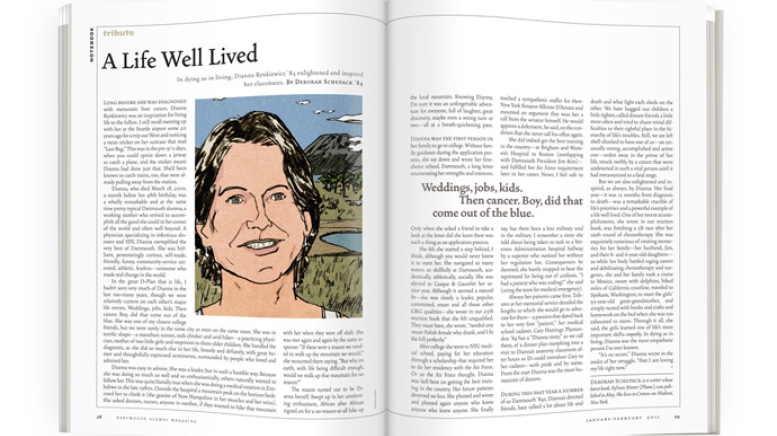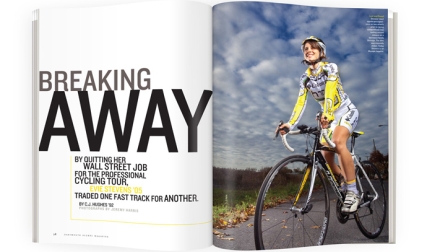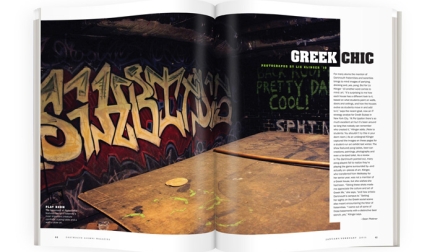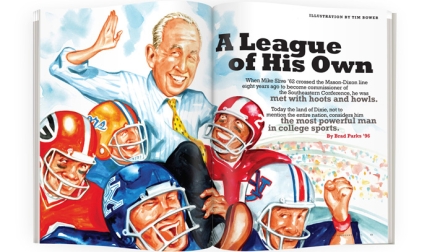Long before she was diagnosed with metastatic liver cancer, Dianna Rynkiewicz was an inspiration for living life to the fullest. I still recall meeting up with her at the Seattle airport some 20 years ago for a trip out West and noticing a neon sticker on her suitcase that read “Last Bag.” This was in the pre-9/11 days, when you could sprint down a jetway to catch a plane, and the sticker meant Dianna had done just that. She’d been known to catch trains, too, that were already pulling away from the station.
Dianna, who died March 18, 2010, a month before her 48th birthday, was a wholly remarkable and at the same time pretty typical Dartmouth alumna, a working mother who strived to accomplish all the good she could in her corner of the world and often well beyond. A physician specializing in infectious diseases and HIV, Dianna exemplified the very best of Dartmouth. She was brilliant, penetratingly curious, self-made, friendly, funny, community-service oriented, athletic, fearless—someone who made real change in the world.
In the great D-Plan that is life, I hadn’t seen very much of Dianna in the last too-many years, though we were relatively current on each other’s major life events. Weddings, jobs, kids. Then cancer. Boy, did that come out of the blue. She was one of my closest college friends, but we were rarely in the same city or even on the same coast. She was in terrific shape—a marathon runner, rock climber and avid hiker—a practicing physician, mother of two little girls and stepmom to three older children. She handled the diagnosis, as she did so much else in her life, bravely and defiantly, with great humor and thoughtfully expressed sentiments, surrounded by people who loved and admired her.
Dianna was easy to admire. She was a leader, but in such a humble way. Because she was doing so much so well and so enthusiastically, others naturally wanted to follow her. This was quite literally true when she was doing a medical rotation in Zimbabwe in the late 1980s. Outside the hospital a mountain peak on the horizon beckoned her to climb it (the granite of New Hampshire in her muscles and her veins). She asked doctors, nurses, anyone in earshot, if they wanted to hike that mountain with her when they were off shift. She was met again and again by the same response: “If there were a reason we needed to walk up the mountain we would,” she recounted them saying. “But why on earth, with life being difficult enough, would we walk up that mountain for no reason?”
The reason turned out to be Dianna herself. Swept up in her unrelenting enthusiasm, African after African signed on for a no-reason-at-all hike up the local mountain. Knowing Dianna, I’m sure it was an unforgettable adventure for everyone, full of laughter, great discovery, maybe even a wrong turn or two—all at a breath-quickening pace.
Dianna was the first person in her family to go to college. Without family guidance during the application process, she sat down and wrote her first-choice school, Dartmouth, a long letter enumerating her strengths and interests. Only when she asked a friend to take a look at the letter did she learn there was such a thing as an application process.
She felt she started a step behind, I think, although you would never know it to meet her. She navigated so many waters so skillfully at Dartmouth, academically, athletically, socially. She was elected to Casque & Gauntlet her senior year. Although it seemed a natural fit—she was clearly a leader, popular, committed, smart and all those other C&G qualities—she wrote in our 25th reunion book that she felt unqualified. They must have, she wrote, “needed one smart Polish female who drank, and I fit the bill perfectly.”
After college she went to NYU medical school, paying for her education through a scholarship that required her to do her residency with the Air Force. Or so the Air Force thought. Dianna was hell-bent on getting the best training in the country. Her future patients deserved no less. She phoned and wrote and phoned again anyone who knew anyone who knew anyone. She finally reached a sympathetic staffer for then-New York Senator Alfonse D’Amato and mounted an argument that won her a call from the senator himself. He would approve a deferment, he said, on the condition that she never call his office again.
She did indeed get the best training in the country—at Brigham and Women’s Hospital in Boston (overlapping with Dartmouth President Jim Kim)—and fulfilled her Air Force requirement later in her career. Never, I feel safe to say, has there been a less military soul in the military. I remember a story she told about being taken to task in a Veterans Administration hospital hallway by a superior who noticed her without her regulation hat. Consequences be damned, she barely stopped to hear the reprimand for being out of uniform. “I had a patient who was coding!” she said (using the term for medical emergency).
Always her patients came first. Tributes at her memorial service detailed the lengths to which she would go to advocate for them—a passion that dated back to her very first “patient,” her medical school cadaver. Cary Hastings Plamondon ’84 has a “Dianna story,” as we call them, of a dinner plan morphing into a visit to Dianna’s anatomy classroom after hours so Di could introduce Cary to her cadaver—with pride and by name. From the start Dianna was the most humanistic of doctors.
During this past year a number of us Dartmouth ’84s, Dianna’s devoted friends, have talked a lot about life and death and what light each sheds on the other. We have hugged our children a little tighter, called distant friends a little more often and tried to shunt trivial difficulties to their rightful place in the hierarchy of life’s troubles. Still, we are left shell-shocked to have one of us—an unusually strong, accomplished and active one—stolen away in the prime of her life, struck swiftly by a cancer that went undetected in such a vital person until it had metastasized to a fatal stage.
But we are also enlightened and inspired, as always, by Dianna. Her final year—it was 15 months from diagnosis to death—was a remarkable crucible of life’s priorities and a powerful example of a life well lived. One of her recent accomplishments, she wrote in our reunion book, was finishing a 5K race after her sixth round of chemotherapy. She was exquisitely conscious of creating memories for her family—her husband, Jim, and their 8- and 6-year-old daughters—so while her body battled raging cancer and debilitating chemotherapy and surgeries, she and her family took a cruise to Mexico, swam with dolphins, biked miles of California coastline, traveled to Spokane, Washington, to meet the girls’ 95-year-old great-grandmother, and simply nested with books and crafts and homework on the bed when she was too exhausted to move. Through it all, she said, the girls learned one of life’s most important skills: empathy. In dying as in living, Dianna was the most empathetic person I’ve ever known.
“It’s no secret,” Dianna wrote in the midst of her struggle, “that I am loving my life right now.”
Deborah Schupack is a writer whose latest book, Sylvan Street (Plume), was published in May. She lives in Croton-on-Hudson, New York.




